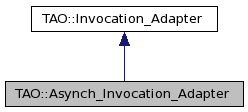Generic interface for the invocation object visible to the IDL compiler. More...
#include <Asynch_Invocation_Adapter.h>


Public Member Functions | |
| Asynch_Invocation_Adapter (CORBA::Object *target, Argument **args, int arg_number, const char *operation, size_t op_len, Collocation_Proxy_Broker *b, TAO::Invocation_Mode mode=TAO_ASYNCHRONOUS_CALLBACK_INVOCATION) | |
| void | invoke (Messaging::ReplyHandler_ptr reply_handler_ptr, const TAO_Reply_Handler_Stub &reply_handler_stub) |
| virtual void | invoke (TAO::Exception_Data *ex, unsigned long ex_count) |
| Invoke the target, and used by the generated code. | |
Protected Member Functions | |
| virtual Invocation_Status | invoke_twoway (TAO_Operation_Details &op, CORBA::Object_var &effective_target, Profile_Transport_Resolver &r, ACE_Time_Value *&max_wait_time) |
| Helper method to make a two way invocation. | |
| virtual Invocation_Status | invoke_collocated_i (TAO_Stub *stub, TAO_Operation_Details &details, CORBA::Object_var &effective_target, Collocation_Strategy strat) |
| Make a collocated call. | |
Private Member Functions | |
| Asynch_Invocation_Adapter (void) | |
| Don't allow default initializations. | |
| Asynch_Invocation_Adapter (const Asynch_Invocation_Adapter &) | |
| Asynch_Invocation_Adapter & | operator= (const Asynch_Invocation_Adapter &) |
Private Attributes | |
| ACE_Utils::Auto_Functor < TAO_Asynch_Reply_Dispatcher_Base, ARDB_Refcount_Functor > | safe_rd_ |
| Autofunctor to manage the reply dispatcher. | |
Generic interface for the invocation object visible to the IDL compiler.
Definition at line 60 of file Asynch_Invocation_Adapter.h.
| TAO::Asynch_Invocation_Adapter::Asynch_Invocation_Adapter | ( | CORBA::Object * | target, | |
| Argument ** | args, | |||
| int | arg_number, | |||
| const char * | operation, | |||
| size_t | op_len, | |||
| Collocation_Proxy_Broker * | b, | |||
| TAO::Invocation_Mode | mode = TAO_ASYNCHRONOUS_CALLBACK_INVOCATION | |||
| ) |
| TAO::Asynch_Invocation_Adapter::Asynch_Invocation_Adapter | ( | void | ) | [private] |
Don't allow default initializations.
| TAO::Asynch_Invocation_Adapter::Asynch_Invocation_Adapter | ( | const Asynch_Invocation_Adapter & | ) | [private] |
| void TAO::Asynch_Invocation_Adapter::invoke | ( | Messaging::ReplyHandler_ptr | reply_handler_ptr, | |
| const TAO_Reply_Handler_Stub & | reply_handler_stub | |||
| ) |
Definition at line 49 of file Asynch_Invocation_Adapter.cpp.
{
TAO_Stub * stub =
this->get_stub ();
if (TAO_debug_level >= 4)
{
ACE_DEBUG ((LM_DEBUG,
"TAO_Messaging (%P|%t) - Asynch_Invocation_Adapter::"
"invoke\n"));
}
// If the reply handler is nil, we do not create a reply dispatcher.
// The ORB will drop replies to which it cannot associate a reply
// dispatcher.
if (!CORBA::is_nil (reply_handler_ptr))
{
// New reply dispatcher on the heap or allocator, because
// we will go out of scope and hand over the reply dispatcher
// to the ORB.
TAO_Asynch_Reply_Dispatcher *rd = 0;
// Get the allocator we could use.
ACE_Allocator* ami_allocator =
stub->orb_core ()->lane_resources().ami_response_handler_allocator();
// If we have an allocator, use it, else use the heap.
if (ami_allocator)
{
ACE_NEW_MALLOC (
rd,
static_cast<TAO_Asynch_Reply_Dispatcher *> (
ami_allocator->malloc (sizeof (TAO_Asynch_Reply_Dispatcher))),
TAO_Asynch_Reply_Dispatcher (reply_handler_stub,
reply_handler_ptr,
stub->orb_core (),
ami_allocator));
}
else
{
ACE_NEW (rd,
TAO_Asynch_Reply_Dispatcher (reply_handler_stub,
reply_handler_ptr,
stub->orb_core (),
0));
}
if (rd == 0)
{
throw ::CORBA::NO_MEMORY ();
}
this->safe_rd_.reset (rd);
}
Invocation_Adapter::invoke (0, 0);
}
| void TAO::Asynch_Invocation_Adapter::invoke | ( | TAO::Exception_Data * | ex, | |
| unsigned long | ex_count | |||
| ) | [virtual] |
Invoke the target, and used by the generated code.
The implementation decides whether the target is remote or collocated and takes the right decision.
| ex | Array of exception data declared by the application in their IDL. | |
| ex_count | Number of elements in the array. |
Reimplemented from TAO::Invocation_Adapter.
Definition at line 110 of file Asynch_Invocation_Adapter.cpp.
{
Invocation_Adapter::invoke (ex, ex_count );
}
| Invocation_Status TAO::Asynch_Invocation_Adapter::invoke_collocated_i | ( | TAO_Stub * | stub, | |
| TAO_Operation_Details & | details, | |||
| CORBA::Object_var & | effective_target, | |||
| Collocation_Strategy | strat | |||
| ) | [protected, virtual] |
Make a collocated call.
This method creates an object that takes care of making collocated invocations and calls invoke () on it. If the invoke () returns with a location forwarded reply we return a restart
| stub | The stub object on which the invocation is made. | |
| details | The operations details of the operation that is being invoked. |
Reimplemented from TAO::Invocation_Adapter.
Definition at line 119 of file Asynch_Invocation_Adapter.cpp.
{
if (stub->orb_core ()->orb_params ()->ami_collication ())
{
// When doing a collocation asynch invocation we shouldn't use the
// stub args but use the skel args
details.use_stub_args (false);
TAO_AMI_Arguments_Converter_Impl* ami_arguments_converter
= ACE_Dynamic_Service<TAO_AMI_Arguments_Converter_Impl>::instance (
"AMI_Arguments_Converter");
details.cac (ami_arguments_converter);
// Release the owner ship of the reply dispatcher
details.reply_dispatcher (this->safe_rd_.release ());
return Invocation_Adapter::invoke_collocated_i (stub,
details,
effective_target,
strat);
}
else
{
ACE_Time_Value *max_wait_time = 0;
return Invocation_Adapter::invoke_remote_i (stub,
details,
effective_target,
max_wait_time);
}
}
| Invocation_Status TAO::Asynch_Invocation_Adapter::invoke_twoway | ( | TAO_Operation_Details & | details, | |
| CORBA::Object_var & | effective_target, | |||
| Profile_Transport_Resolver & | r, | |||
| ACE_Time_Value *& | max_wait_time | |||
| ) | [protected, virtual] |
Helper method to make a two way invocation.
This method creates a synchronous twoway invocation object to which the actual task of request handling is delegated. Once the invocation returns this method checks whether the request is forwarded to a new location.
Reimplemented from TAO::Invocation_Adapter.
Definition at line 155 of file Asynch_Invocation_Adapter.cpp.
{
// Simple sanity check
if (this->mode_ != TAO_ASYNCHRONOUS_CALLBACK_INVOCATION
|| this->type_ != TAO_TWOWAY_INVOCATION)
{
throw ::CORBA::INTERNAL (
CORBA::SystemException::_tao_minor_code (
TAO::VMCID,
EINVAL),
CORBA::COMPLETED_NO);
}
if (this->safe_rd_.get () && r.transport ())
{
this->safe_rd_->transport (r.transport ());
// AMI Timeout Handling Begin
ACE_Time_Value tmp;
if (this->get_timeout (r.stub (), tmp))
{
this->safe_rd_->schedule_timer (op.request_id (), *max_wait_time);
}
}
// Loose ownership of the reply dispatcher
TAO::Asynch_Remote_Invocation asynch (
effective_target.in (),
r,
op,
this->safe_rd_.release ());
Invocation_Status const s = asynch.remote_invocation (max_wait_time);
if (s == TAO_INVOKE_RESTART &&
(asynch.reply_status () == GIOP::LOCATION_FORWARD ||
asynch.reply_status () == GIOP::LOCATION_FORWARD_PERM))
{
CORBA::Boolean const permanent_forward =
(asynch.reply_status () == GIOP::LOCATION_FORWARD_PERM);
effective_target = asynch.steal_forwarded_reference ();
this->object_forwarded (effective_target, r.stub (), permanent_forward);
}
return s;
}
| Asynch_Invocation_Adapter& TAO::Asynch_Invocation_Adapter::operator= | ( | const Asynch_Invocation_Adapter & | ) | [private] |
ACE_Utils::Auto_Functor<TAO_Asynch_Reply_Dispatcher_Base, ARDB_Refcount_Functor> TAO::Asynch_Invocation_Adapter::safe_rd_ [private] |
Autofunctor to manage the reply dispatcher.
Definition at line 94 of file Asynch_Invocation_Adapter.h.
 1.7.0
1.7.0